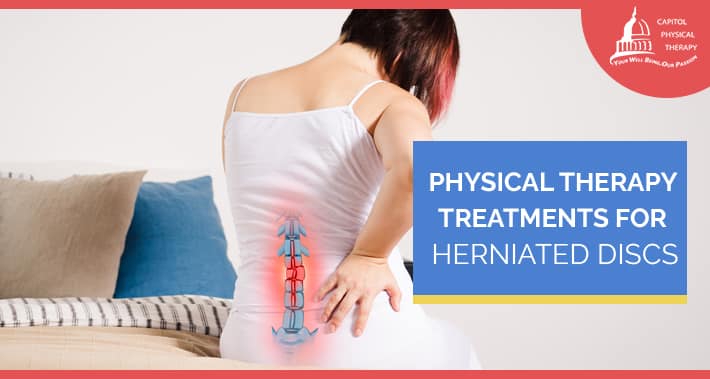
What is a herniated disc and how can physical therapy help if you are diagnosed with one?
If you have been diagnosed with a herniated or slipped disc, it can be confusing as to what this means and what impact it can have on you.
Severe back pain is invasive and debilitating, after all.
If you’re told your back pain may be due to a herniated disc, it can be a little frightening.
However, a herniated disc alone isn’t always the source of your back pain.
In many cases, it only becomes an issue when the disc is pressing on a nerve or other tissue.
In extreme cases the condition requires surgery, but most often back pain resolves on its own.
In the meantime, there are options to help ease your pain.
If you’re dealing with back pain, whether for a herniated disc or another cause, here at Capital Physical Therapy we can help with pain management physical therapy solutions.
Let’s take a closer look at the causes and symptoms of this condition, and the relief that we can offer at our Washington DC physical therapist clinic.
What Is A Herniated Disc?
Your spinal discs are located between your vertebrae, serving as shock absorbers for these large bones of your back.
A herniated, or ruptured, disc occurs when the interior portion of the disc protrudes, altering the shape of the disc causing pain and discomfort.
If the herniated disc presses on one of your spinal nerves, you can also experience pain along the affected nerve.
You can have a ruptured disc in any part of your spine, from your neck down to your lower back.
Your doctor will complete a physical exam before diagnosing you with a herniated disc, checking nerve function and muscle strength, as well as looking for the source of your pain.
What Are The Symptoms Of Herniated Disc?
Symptoms of a slipped disc vary from person to person, depending on what structures are involved.
However, lower back pain combined with a shooting pain down one or both of the legs is a telltale sign of a ruptured disc pressing on a nerve.
This is also known as sciatica, and can include tingling in one or both feet or weakness in the leg.
Other symptoms of a slipped disc pressing on a nerve include:
- pain and numbness on one side of the body
- pain that extends down your arms
- pain that gets worse from standing or sitting
- aching or burning sensations in the affected area
- pain that worsens with certain movements
What Causes A Herniated Disc?
The discs between your vertebrae are rubbery and flexible, allowing for the spine to twist and bend.
Over time, however, the discs start to wear out, flattening or bulging slightly with age.
The gelatinous interior of the disc becomes dry and stiff, and the layers of the disc wall start to deteriorate.
A weakness or tear in the outer ring of the disc causes the inner portion to slip out of place, causing an alteration of shape and possibly pressing on the nerves exiting out of the spinal cord.
A damaged disc pressing on the spinal nerves causes inflammation and pain in the back or neck.
The sciatic nerve runs through the buttock and down the leg into the foot, which is why these areas are often the target of pain from a slipped disc due to a lower back injury.
A disc can rupture when under unusual strain, such as lifting a heavy object or twisting while lifting.
As you age, from your mid thirties and beyond, you are more likely to experience this condition, which can also be caused by degenerative disc disease as you age.
However, there are methods you can use to reduce your risk and alleviate symptoms if it does occur.
A sedentary lifestyle, poor posture, and poor muscle maintenance are also contributing factors.
Physical Therapy Treatment For Herniated Discs
In many cases, you might not even be aware that you have a herniated disc and they do not cause you any problems.
However, there are methods you can use to alleviate your pain if you experience pain associated with it.
In the most extreme cases, a severe untreated slipped disc can cause permanent nerve damage and surgery is recommended.
But studies have shown that for most people, working with a physical therapist helps to strengthen weak muscles, alleviate pain, and get back to their everyday lives.
Your physical therapist will build an exercise program that works for you to help prevent this issue from recurring.
Passive Treatments For Pain Arising From Herniated Discs
While you are in extreme pain, or your back is in spasm, a more passive treatment plan is recommended.
Here are some examples of passive treatments you may receive:
- Deep tissue massage
- Dry needling
- Transcutaneous electrical nerve stimulation (TENS)
- Hydrotherapy
- Traction
- Heat and cold therapy
Some of these treatments are better suited to different symptoms.
One example is that dry needling is very effective for reducing sciatica pain.
Passive treatments will target the affected areas and help to relieve your pain.

Active Treatments For Pain Associated With Herniated Discs
Once your body starts to heal, moving to a more active treatment plan allows you to develop the core strength and flexibility you need to relieve symptoms and prevent the condition from recurring.
It’s important not to get too comfortable and skip the active treatment when your pain is reduced.
Studies have shown that while passive treatments like transcutaneous electrical nerve stimulation are great for pain relief, active exercises are still the best for reducing your symptoms and preventing reoccurrence.
This is why it’s very important that you stick to your full treatment plan.
Some examples of active treatments include:
- Flexibility training
- Core strengthening
- Muscle conditioning
- Hydrotherapy
Your physical therapist will work with you to build an exercise program that works for you.
They might even recommend low impact physical activities like yoga or pilates that will build strength and improve your quality of life with consistent practice.
You will learn to understand how to treat your symptoms at home, using techniques that will keep your back healthy once you have healed.
Book Your Appointment With Capitol Physical Therapy Today
Working with a physical therapist is essential for you to learn the exercises you can use once the formal therapy is complete to maintain back health and core strength.
At Capitol Physical Therapy you will work one-on-one with a therapist who will build a program that works for you and will teach you the methods needed to heal your back and enjoy a healthy lifestyle.
We also have a great repertoire of articles and videos for you to reference if you’re looking for more information outside of office hours.
If you live in the Washington D.C. area and are suffering the pain of a herniated disc, whatever the cause, call Capitol Physical Therapy today and we can help.
Book your appointment with Capitol Physical Therapy today.
1331 H St NW #200,
Washington, DC 20005
- https://g.page/capitolptdc
9560 Pennsylvania Ave. # 202,
Upper Marlboro, MD 20772
- https://goo.gl/maps/zjL4NnnuThRhrcS86
Capitol Physical Therapy offers orthopedic and other pain related solutions, with our versitile team of physical therapists in Washington, DC